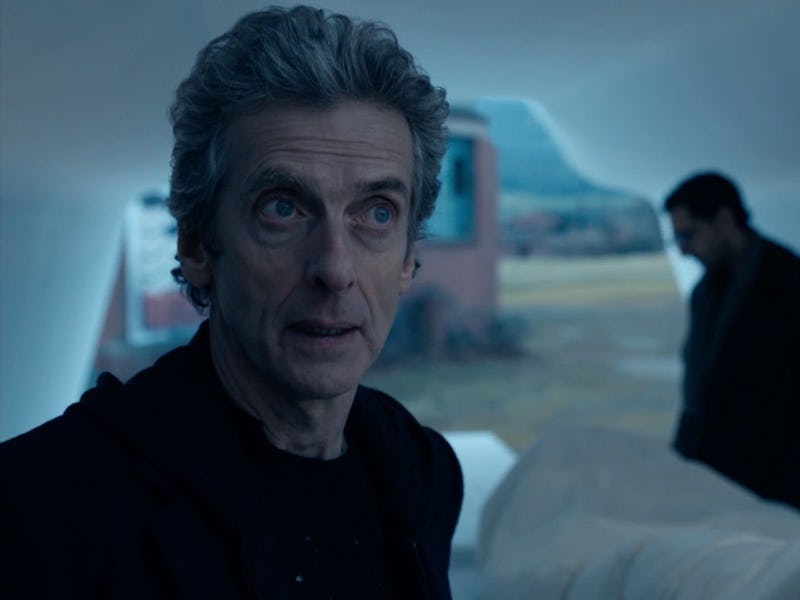Dr. Who and the Bootstrap Paradox Is Sci-fi Time Travel With Actual Physics
Capaldi channels his inner Stephen Hawking and drops some theoretical science knowledge.

Dr. Who Season 9’s Before the Flood broke convention a bit and opened with a monologue from the Doctor explaining the bootstrap paradox, an intellectual puzzle box named for Robert A. Heinlein’s science-fiction short story “By His Bootstraps.”
The monologue goes something like this. A time-traveler goes to 18th century Germany to meet his hero, Beethoven. Unfortunately, there is one small problem: According to all of his contemporaries, no one has ever heard of this Ludwig fellow. The time-traveler, not wanting to see all of the apparently non-existent composer’s great works lost to history (or rather, never existing), decides to transcribe all of the symphonies and publish them himself under Beethoven’s moniker.
The question becomes, if the time-traveler had to copy and publish all of Beethoven’s work because Beethoven never existed, who actually composed the music?
(Aside: We know that Steven Moffat and co. wanted to focus more on the, ahem, spacey-wacey aspect of Dr. Who, but was I the only one thinking a Dr.-Who-as-Beethoven scenario would kick all the ass? C’mon, now!)
The bootstrap paradox, also known as the predestination paradox, ontological paradox, or causal loop, depending on your textbook of choice, has been a tried and true plot device for time-traveling sci-fi for the better part of 70 years. However, since the days of Verne and Wells, science-fiction concepts often act as a starting point of serious academic debates for philosophers and physicists alike: Is time travel is possible? And if so, how do we account for paradoxes?
With something as abstract as idea or thought (or in this case, arrangement of music) your best philosopher buddies might be able to accept that because nothing physically changed, the bootstrap paradox could exist as a tidy little loop.
Though cause has to precede effect, this need not operate in linear chronological fashion if time truly exists as a curve or circuit; the future creating the past alters the loop, but doesn’t change the reality, thus keeping the loop intact. The fact that the time-traveler can buy Moonlight Sonata on iTunes proves that Beethoven’s music exists somewhere in the space-time continuum. Whether the notes were penned by some crusty German dude in the 18th century or a Gallifreyan in a blue police box, the music exists; the order of how it got there is more or less a detail.
But what if we apply that to something more tangible? Instead of affecting how something comes to exists, what if the time traveler seeks to create or erase a person, thing, out of existence completely?
Suppose that our time-traveler built a time machine specifically to go back in time to kill teenaged Hitler. A reasonable goal to be sure, but if our time-traveler succeeded in erasing Hitler, he would never have had the motivation to create the time machine in the first place. If the time-traveler doesn’t build the time machine, Hitler lives, which of course would cause the time-traveler to go build his time machine.
That snarl might just topple the premise of the entire genre. If we’re to believe Stephen Hawking’s essay on the possibilities of time travel, variations on this Grandfather paradox more or less prove that time travel, at least to the past, can never happen. (Though he goes on to hypothesize that travel to the future is possible if you go really REALLY fast).
While the Doctor’s Beethoven scenario forms a neatly contained loop where the outcome is always the same, a cyclical disruption of cause and effect would create such an immense feedback loop that it would basically break, uh, all of time and space. For the big brains, breaking time and space may be the most impossible paradox of them all: If you break all of time and space, you’d erase the event that broke time and space in the first place which meant that time and space would never be broken, until it broke again, and … Jesus, is that part of my brain leaking out of my ear?
Dr. Who fans have seen these theoretical principles applied more and more over the past two seasons. In last season’s finale, Dark Water, the Doctor tells Clara they can’t go back in time to save Danny Pink, because if he was alive, she’d never make the demand in the first place. However, Dr. Who can help save the team from the base at the bottom of the flooded city by flooding the dam, because the dam was always flooded in the first place.
While time travel on the TARDIS scale will never be possible in reality, it’s nice to see Moffat and Co. employ some actual scientific theory, no matter how far-fetched.